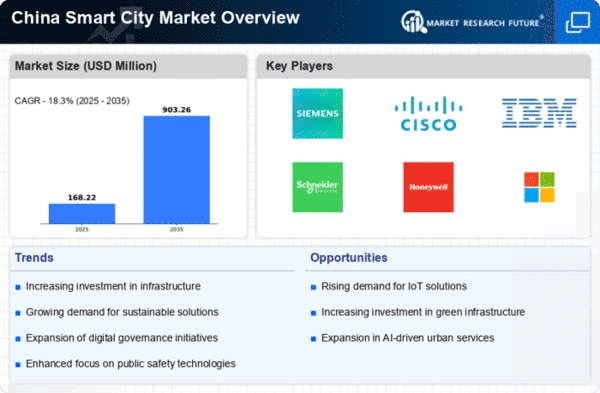Government Initiatives and Funding
The Chinese government actively promotes the development of The smart city market in China through various initiatives and funding programs. In recent years, substantial investments have been allocated to enhance urban infrastructure, with an estimated $100 billion earmarked for smart city projects by 2025. This financial backing is aimed at fostering innovation and technology adoption in urban areas. The government's commitment to smart city development is evident in its 13th and 14th Five-Year Plans, which emphasize the integration of advanced technologies in urban management. Such initiatives not only stimulate economic growth but also create a conducive environment for private sector participation in the smart city market. As a result, the collaboration between public and private entities is likely to accelerate the implementation of smart solutions across various cities in China.
Urbanization and Population Growth
China's rapid urbanization and population growth are pivotal drivers of the The smart city market in China. With over 60% of its population residing in urban areas, the demand for efficient urban management solutions is escalating. By 2030, it is projected that approximately 1 billion people will live in cities, necessitating innovative approaches to address challenges such as traffic congestion, waste management, and energy consumption. The smart city market is positioned to provide solutions that enhance the quality of life for urban residents. For instance, smart transportation systems can reduce travel times and emissions, while smart waste management can optimize resource allocation. The increasing urban population is likely to propel investments in smart technologies, thereby fostering a robust market environment.
Public Demand for Enhanced Services
The increasing public demand for improved urban services is a significant driver of the The smart city market in China. Citizens are seeking more efficient and responsive services, such as better public transportation, waste management, and healthcare access. This demand is prompting local governments to invest in smart technologies that enhance service delivery. For instance, smart public transport systems can provide real-time updates to commuters, improving overall user experience. Additionally, the integration of smart health solutions can facilitate remote patient monitoring and telemedicine, addressing healthcare accessibility issues. As public expectations continue to rise, the smart city market is likely to expand, driven by the need for innovative solutions that meet the evolving needs of urban populations.
Environmental Concerns and Sustainability
Environmental sustainability is increasingly becoming a focal point in the The smart city market in China. In response to growing concerns about pollution and climate change, Chinese cities are adopting smart solutions aimed at reducing their environmental footprint. Initiatives such as smart energy management systems and green building technologies are gaining traction, with the market for smart energy solutions projected to reach $50 billion by 2026. These technologies not only contribute to energy efficiency but also promote the use of renewable energy sources. The emphasis on sustainability aligns with China's commitment to achieving carbon neutrality by 2060, thereby driving investments in smart city projects that prioritize environmental considerations. This trend indicates a shift towards more sustainable urban development practices.
Technological Advancements in Communication
The advancement of communication technologies is a crucial factor influencing the The smart city market in China in China. The rollout of 5G networks is expected to revolutionize urban connectivity, enabling real-time data exchange and enhancing the efficiency of smart city applications. With 5G technology, cities can implement smart traffic management systems that utilize real-time data to optimize traffic flow, potentially reducing congestion by up to 30%. Furthermore, the integration of artificial intelligence and big data analytics into urban services is likely to improve decision-making processes. As these technologies continue to evolve, they will play a significant role in shaping the smart city market, facilitating the development of interconnected systems that enhance urban living.















